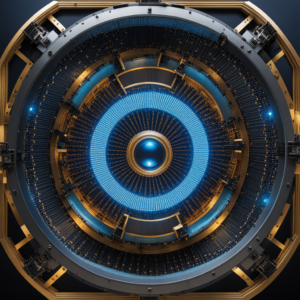In this comprehensive guide, we’ll unravel the complexities surrounding how do quantum algorithms work, demystifying the intricacies with a focus on accessibility and understanding.

Quantum algorithms leverage the principles of quantum mechanics to perform computations in ways that can outpace classical algorithms for certain problems. Here’s a simplified explanation of how quantum algorithms work:
Key Quantum Concepts:
- Superposition:
- Classical bits can exist in a state of 0 or 1.
- Quantum bits, or qubits, can exist in a superposition of 0 and 1 simultaneously.
- Entanglement:
- Qubits can become entangled, meaning the state of one qubit is directly related to the state of another, regardless of the distance between them.
- Interference:
- Quantum systems can exhibit constructive or destructive interference, influencing the probability of measuring a particular outcome.
Quantum Algorithm Steps:
- Initialization:
- Start with a set of qubits initialized in a specific state.
- Superposition:
- Place qubits in a superposition of states, allowing them to represent multiple possibilities simultaneously.
- Entanglement:
- Create entanglement among qubits, linking their states.
- Quantum Gate Operations:
- Apply quantum gate operations to manipulate the qubits. These gates are analogous to classical logical gates but operate on quantum states.
- Interference:
- Leverage interference to enhance the probability of obtaining the correct solution and reduce the probability of incorrect solutions.
- Measurement:
- Measure to collapse the superposition, obtaining a classical outcome (0 or 1) for each qubit.
Examples:
- Grover’s Algorithm:
- Used for unstructured search problems.
- Superposition is employed to represent multiple possible solutions simultaneously.
- Quantum oracle reflects the amplitudes of incorrect solutions, and interference amplifies the correct solution’s amplitude.
- Shor’s Algorithm:
- Applied to factor large numbers into their prime components.
- Utilizes the quantum Fourier transform and modular exponentiation.
- Leverages quantum parallelism to explore multiple possibilities simultaneously.
- Quantum Fourier Transform (QFT):
- Essential in various quantum algorithms.
- Performs a mathematical transformation on qubit states, exploiting quantum parallelism and interference.
Challenges and Considerations:
- Decoherence: Quantum states are delicate and susceptible to environmental interactions. Maintaining coherence during computations is a significant challenge.
- Error Correction: Errors in quantum computations, caused by noise and decoherence, necessitate the development of quantum error correction techniques.
- Resource Requirements: Quantum algorithms may require a large number of qubits and gates, making practical implementation challenging with current quantum hardware.

How Do Quantum Algorithms Work in Practice
Quantum Walks: A Quantum Leap in Search Algorithms
Dive into the fascinating world of quantum walks, where algorithms explore solution spaces efficiently. Learn how quantum algorithms leverage quantum walks for improved search capabilities, revolutionizing problem-solving.
Grover’s Algorithm: Quantum Searching Made Efficient
Explore Grover’s algorithm, a quantum search algorithm that boasts quadratic speedup compared to classical algorithms. Understand the mechanics behind its efficiency in searching unsorted databases.
FAQs – Unlocking Further Insights
Q: Are quantum algorithms practical for everyday computing tasks?
A: While quantum algorithms excel in specific domains, practical applications for everyday tasks are still in the developmental stage. Quantum computing’s true potential lies in solving complex problems like optimization and cryptography.
Q: How do quantum algorithms handle errors?
A: Quantum error correction techniques, such as qubit redundancy and error-detecting codes, are employed to mitigate errors in quantum computations, ensuring the accuracy of results.
Q: Can classical computers replicate the functions of quantum algorithms?
A: No, classical computers lack the inherent parallelism and superposition capabilities that define quantum algorithms. Replicating these functions classically would be impractical due to the fundamental differences in computing paradigms.
Q: Are quantum algorithms immune to hacking?
A: While quantum algorithms offer enhanced security through quantum key distribution, they aren’t entirely immune to hacking. Ongoing research focuses on refining quantum cryptographic protocols to bolster security.
Q: What industries stand to benefit the most from quantum algorithms?
A: Industries dealing with complex optimization problems, such as logistics, finance, and drug discovery, are poised to reap substantial benefits from the application of quantum algorithms.
Q: How accessible is quantum computing for researchers and developers?
A: Quantum computing accessibility is growing, with cloud-based quantum computing services offering researchers and developers the opportunity to experiment and develop quantum algorithms without the need for specialized hardware.
Conclusion
In conclusion, the journey through the intricacies of how quantum algorithms work reveals a landscape of unparalleled computational potential. From Shor’s algorithm to quantum walks, the quantum realm holds promises and challenges that will shape the future of computing.
Learn from the internet [click here]
How Do Quantum Algorithms Work? How Do Quantum Algorithms Work? How Do Quantum Algorithms Work?


2 thoughts on “How Do Quantum Algorithms Work”